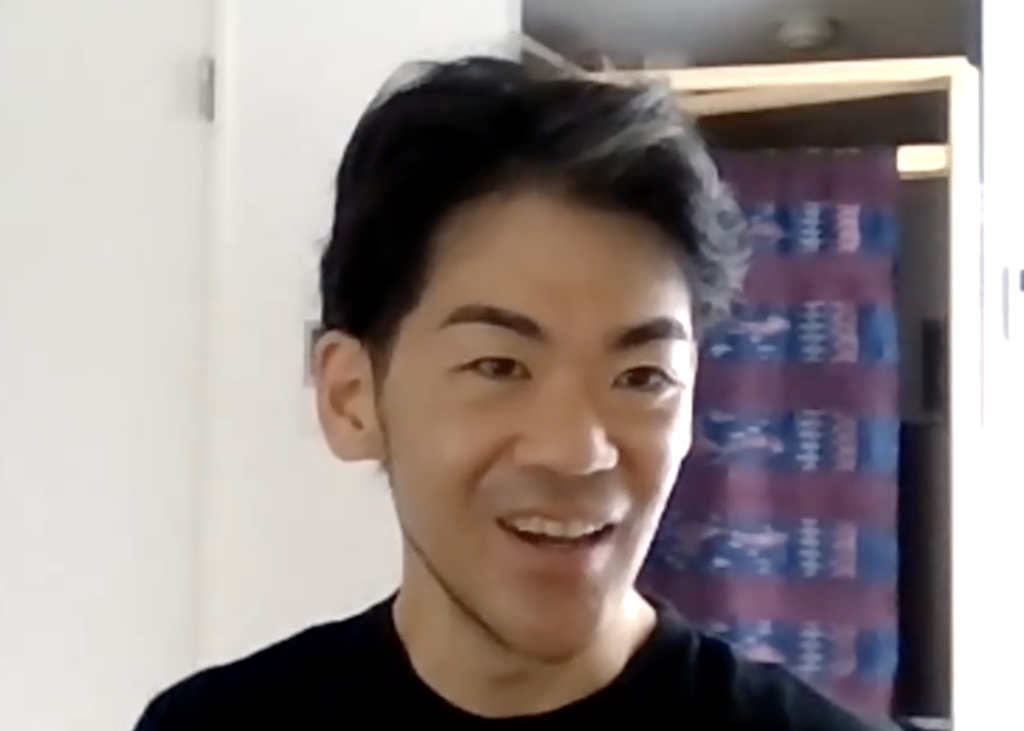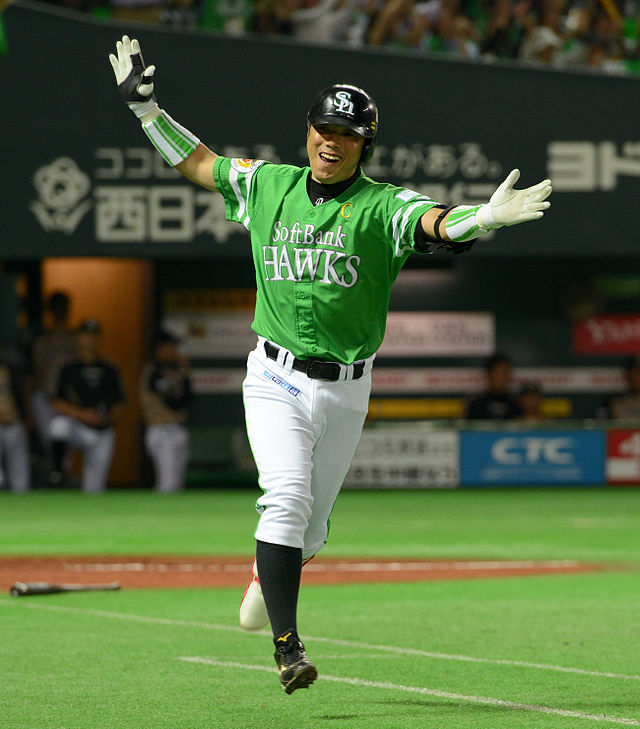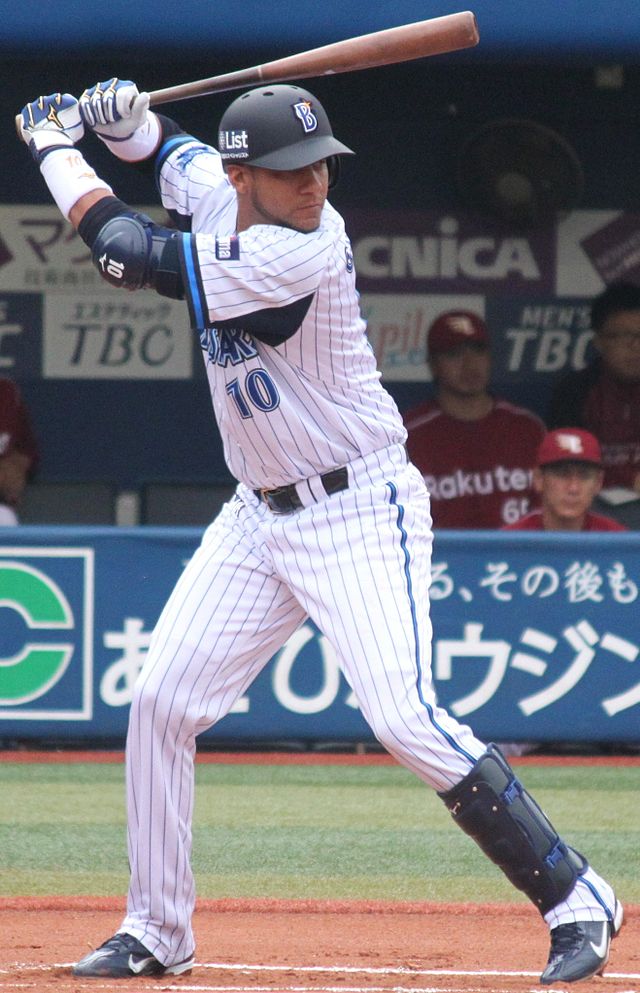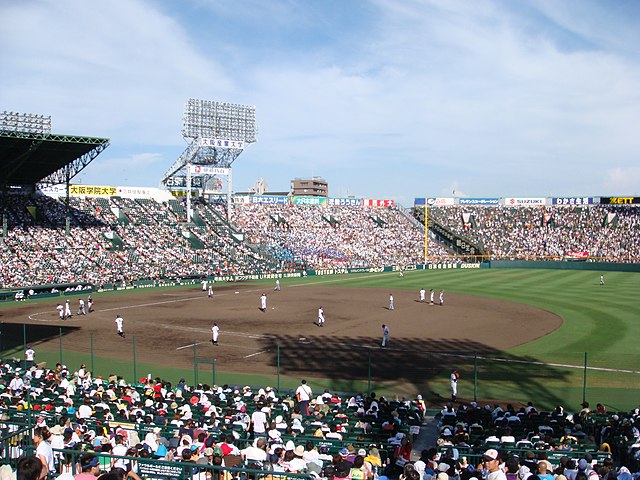Fukuoka SoftBank Hawks AGM Shun Kakazu talks scouting, organizational success on “Chatter Up!”

The allure of working in the front offices of a favorite club has undoubtedly enticed many a baseball fan over the years. Whether inspired by the curse-breaking successes of Theo Epstein with the Boston Red Sox and Chicago Cubs or laughing at the bumbling George Costanza with the New York Yankees on “Seinfeld,” sitting in on big decision-making meetings, offering insights on trades or player signings, and finding oneself at the forefront of the game is the stuff baseball dreams are made of. Shun Kakazu has turned that dream into a reality.
The assistant general manager of the Fukuoka SoftBank Hawks recently sat down with a JapanBall “Chatter Up!” audience and explained to the crowd that, like many others, he became interested in a baseball career when he read the most famous baseball book of his generation – Moneyball by Michael Lewis.
Kakazu related that “baseball has always been a part of my life, but I never thought that I’d actually do it for a job”. That changed after he read Moneyball in 2004. “I thought it was a cool thing; working for a baseball team, running the team without real playing experience,” he elaborated, regarding how the book influenced his career path. But he was also trying to maintain a realistic perspective, knowing how competitive the baseball industry can be.
“I thought that maybe I could do it for a couple of years, and if I don’t, maybe I can switch jobs. It took me almost two years to get a job… because the baseball industry is really small, and everybody wants to get in.”
Kakazu knew he would need to be persistent in order to achieve his dream, but sometimes a little bit of good fortune goes a long way in bringing a dream to fruition.
“I was looking for a job in [Major League Baseball] first, but I just couldn’t get any,” he explained. “When I got to meet Bobby Valentine through a connection, he recommended me to the Chiba Lotte Marines, and I started my career. Now it’s been 16 years working with baseball, so it’s been fun.”
SoftBank’s Winning Philosophy

Fun, indeed. Kakazu just finished his third season with the Hawks, a franchise that has been defined by their recent success, winning six of the past eight Japan Series, including four consecutive titles from 2016 to 2020. The Hawks’ success, Kakazu explained to the audience, is attributed to a philosophy set forth by their owner, Masayoshi Son, who is the founder and CEO of SoftBank.
“Our goal, since SoftBank bought the Hawks, was to become the world’s best club – the world’s number one club – and then beat the MLB champions,” Kakazu said. “That has been the dream of our owner Masayoshi Son, and we’re trying to figure out a way to achieve that somehow.”
Kakazu added that it was part of an ongoing project he was working on – the pursuit of creating a competition to name an undisputed world champion:
“I have been talking with MLB, trying to figure out a way to have that kind of competition,” Kakazu said. “Just trying to think outside the box, to make the Hawks not just number one in Japan, but number one in the world. So that’s kind of like another [piece of] homework that I have.”
The Hawks were a main topic of discussion for the “Chatter Up!” audience, as many were trying to gain insight on one of the greater sports dynasties in recent memory. While Kakazu does hold a critical role in the organization, he veered away from taking any credit for the team’s success and instead chose to highlight the resources the team enjoys thanks to their fantastic ownership – something, he hopes, becomes a trend across the Japanese baseball sphere.
“I joined two years ago, so I’m just talking about how great we have been before I joined,” Kakazu said. “But it takes time to build a baseball team, you know: when you sign an 18-year-old kid, he won’t be ready for another five years, so your success as a baseball team comes from a few years of building,” he added, reminding the audience that there is no such thing as an “overnight success” in baseball.
He went on to elaborate, “Our success – watching from a perspective of coming over from MLB – I would say three things. One is plain and simple: we have money to sign good players… if you had a limited budget, signing a big player and then not being able to get production out of him would be a disaster, but since we have money, we can absorb the error. Then, being able to sign and retain all these players… [they’re some of] the best in the league, and keeping them with some rich contracts, that obviously helps.”
Working without concern over budget restrictions is an important ingredient, but on its own is not enough to guarantee success. So what, exactly, is in the secret sauce? Kakazu let us in on the answer:
“Another thing – this is kind of philosophical – but because we’re winning, I think we have the winning culture. That’s the second, and then the third one is… we’re one of the only teams that have the second minor league team in Japan, and we have lots of developmental players…on the minor league deals, and then having them play on second minor league teams, and having lots of playing opportunities for them, that has helped as well. It took a while, obviously, to get production out of that – I think it’s been ten years we’ve been doing that – but I think that paid off and I don’t see why other teams are not following us on that. It’s not too much money, which obviously is a factor, but it’s only like a couple hundred million yen – a couple million dollars – to run the whole team. So I think they should do that more often than that.”
The Challenges and Successes of International Scouting

While Kakazu has been quick to note the system the Hawks have put in place for future success, there’s certainly a reason why he was selected to be their next director of scouting in 2019. Kakazu has had a litany of success scoring foreign talent, both in their own environment and abroad. He shared one unique experience he had with the “Chatter Up!” audience when, as director of international operations for the Yokohama DeNA BayStars, he worked out an unprecedented deal with the Cuban government to bring foreign baseball talent to Japan:
“It all started out when I saw this small article in the newspaper saying that the Cuban government was going to allow their athletes to play overseas,” Kakazu said. “They just made an announcement saying that, and that was it. I thought, ‘Oh, God, this is interesting.’ I was going to the Dominican Republic one winter, and I went over to Cuba and I met with some people from the embassies and all. That helped me get in front of the Sports Ministry, and I had a meeting with them in Havana; I expressed our interest in signing Cuban players, maybe in the future, and they were appreciative; they said we were the first one to get over and meet them in person, and then they were really thankful for that and said ‘let’s talk in the future.” So we started talking, and Yomiuri also came over, and we had to do some negotiations and all that… but it was one of the coolest things that I picked up, signing a player [Yulieski Gurriel] out of Cuba. And being able to go back and forth to Cuba was also a great experience. That was really fun.”
Kakazu discussed the numerous players traveling back and forth between the various leagues around the world. “I think that the importance of scouting player markets in Asia has been growing,” Kakazu said. “Not just because there are more and more Japanese players and Korean players going to the States, but also [because of the] American non-foreign players in Japan and Korea, they have been very successful in going back to the States.”
He cited Miles Mikolas as an example. Miles “pitched for Yomiuri for like three years, had been dominant, and then went over went back to the States, and all of a sudden, he’s [one of] the winningest pitchers in the National League; he is the biggest example but so there has been a lot of cases of that. MLB scouts are looking into the Asian market – Japan and Korea, especially – to see if there are players that will come over.”
Taking on the NPB/MLB Posting System
A focus of Kakazu’s career has been bringing foreign talent to Japan, but he also explained the value in keeping domestic talent in NPB. The posting system, with its exorbitant fees going from MLB to NPB teams, is a tempting source of funds for many NPB clubs. However, the Hawks’ front office, which remains focused on building the best team in the world and is backed by a corporation that is amongst the biggest in the world, avoids the posting process. When asked about how and why they’ve gone about preventing their players from being posted to MLB clubs, Kakazu said it was due to the good work of ownership and the resources made available through their philosophy of “winning first.”
“In Japanese baseball, when you have money, you don’t really need that much to spend,” Kakazu said. “If we lose a star player or whatever, and [we] can get something in return, then we would consider it; just like lots of MLB teams would do. If you trade away your star player and you get a prospect, that’s kind of how you get your baseball team ecosystem going, but if we just get money from an MLB team by selling a player to them, we don’t really know how to use that money to help that baseball team.”
Kakazu explained how the concept of money in exchange for a player contrasts with SoftBank’s ethos:
“They don’t want us to make more money and then end up losing, so our ownership has been clear in saying, ‘we don’t care how much you spend, we just want you to win’…. If we could put our top player on there and then get 20 million from the Yankees, and then we could spend that 20 million to get a player from the Yankees, then we would do that, but I don’t think it’s that simple.”
The Future of Japanese Baseball

While Kakazu may be a part of the front office that’s changing professional Japanese baseball, he is acutely aware of the sport’s declining popularity in both Japan and the United States. Knowing that it starts with the kids, Kakazu explained what he believes to be best for the sport going forward, and what to expect from Japanese youth baseball:
“I think there are more and more kids that are playing no sports at all,” Kakazu relented. “I have been reading lots of articles and surveys about the baseball population in Japan and also in the States, and you’re losing kids to something other than sports. It’s not just soccer versus baseball, or basketball versus baseball, or sports versus smartphones, and all that stuff. That’s the kind of issue that we need to tackle globally.”
While he mentioned the success of MLB in trying to shorten the game for a broader audience, Kakazu also turned his attention to the structure of the Japanese game, explaining why he believes high school baseball to be the key to the sport’s longevity in the nation:
“High school baseball is the foundation of Japanese baseball,” Kakazu asserted. “Everybody wants to play in the Koshien tournament; that has obviously been a drive for all the kids that are interested in playing baseball, so we’re fine, at least for now. But we can’t just sit there and do nothing and hope that Koshien is going to be the driver for the Japanese baseball population, so yeah, we need to do something. I think that it’s a long project.”
While there are plenty of projects on Kakazu’s desks to tackle, there’s no doubt that he’s up to the challenge and ready for anything that comes his way, embodying a mentality that many JapanBallers can relate with:
“I love baseball, so anything that can help me get involved in baseball or behind it, that’s really my goal,” Kakazu stated. “I love Japanese baseball… I kind of have a sentimental reason to make Japanese baseball better. I also love MLB. I love going back and forth between the US and Japan… I kind of want to be a bridge between Japan and the US through baseball, and help baseball globally… whatever I can do to help that, I’d be happy to do so. Anything that could help me be involved in baseball and make it better, is great. That’s my goal.”
For more “Chatter Up!” be sure to check out our features page!